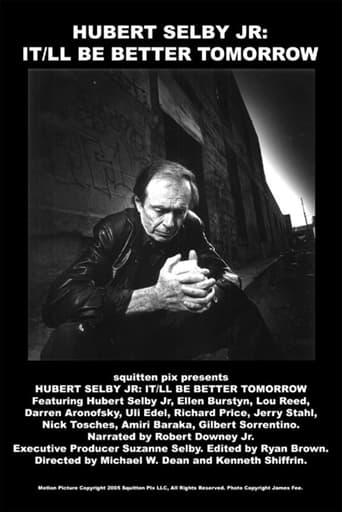

This film is a soulful, compassionate, funny, inspiring fly-on-the-wall look right into the heart and soul of one of the great, unsung minds of American letters. One of those movies where you come out wanting to run home and get right to work making the world a better, smarter place. Kenneth Shiffrin and Michael W. Dean show their love for their subject with great passion and understanding and uncanny skill in this impressive, no-budget directorial effort. We need more of this kind of insightful, passionate film-making in today's take the money and dumb-em- down, shoot-em-up medium.-- Jonathan Shaw (Author of 'Savage Grace' and 'Scabvendor: Confessions of a Tattoo Artist')
... View MoreHubert Selby is the author of "Last Exit to Brooklyn" and "Requiem for a Dream". Michael W. Dean and Kenneth Shiffrin have done a great service by shedding illumination on the history of this author and the importance of his work. Dean and Shiffrin create a documentary that allows Hubert Selby's story to unfold in heart- breaking and fascinating detail, using a combination of interviews, historical footage, and video of Hubert Selby himself during the final period of his life.The author is shown in an emaciated state, struggling for breath, near death. It seems both ironic and remarkable, then, that the film is able to present Hubert Selby as a true survivor. Selby survived childhood tuberculosis, (according to the film, he was the only one in his hospital ward who DID survive). He survived a stint in the military. He survived heroin addiction. He survived mental illness. He survived an obscenity trial for his writing. At age 40, he found himself alive, sober, and impoverished. At the end of his life, at age 75, he found himself in the position of a revered author, influence, and inspiration to several generations of creative individuals. He had gone from being the subject of a witch-hunt to the subject of academia. He himself had become a university professor, teaching almost until the time of his death. The film is narrated in a low-key manner by Robert Downey Jr, who may have found something to relate to in Selby's personal struggles.Selby emerges as a true genius; bending, modifying, and creating his own systems of language to more appropriately and precisely express himself. It's satisfying and just to have his life and work documented by this thoughtful and well-crafted film, at the time of his passing. I hope "HUBERT SELBY JR: IT/LL BE BETTER TOMORROW" serves as a catalyst to create further interest in this fascinating artist.
... View MoreI saw this wonderful film last night at the Egyptian Theater in Hollywood. I have often wished I had met Cubby Selby in person - the directors, Kenneth Shiffrin and Michael W. Dean, did more than deliver a film - they create an outlet for us all to spend a moment with this unsung artist. The insight this movie gives into the world of Cubby Selby is pretty astonishing. I certainly wasn't expecting to be handed keys to his creative process while simultaneously being uplifted by the journey of this absolute spiritual being who was unapologetically human. Cause for both tears and laughter... this film will touch your heart.
... View MoreFor those who've never heard of Selby, this film is a perfectly-pitched introduction to his life and writings. For those already familiar with Selby's astonishing literary creations -- LAST EXIT TO BROOKLYN primary among them, of course -- HUBERT SELBY JR.: IT/LL BE BETTER TOMORROW provides a long-overdue insight into the man himself, painting a vivid and sensitive portrait of an individual attempting to live an artist's life in the latter half of the twentieth century. It sure ain't an easy row to hoe, but Selby's uncompromising approach to the challenge, coupled with the extraordinary humanity and kindness he exhibits, goes a long way toward explaining the genius at the heart of his art. There's a particularly moving segment depicting Selby doing his laundry (in the coin-operated room of his apartment building designed for that purpose) that dramatically reveals some of the tortuous physical sacrifices he was forced to undergo during his lifetime -- sacrifices that have been transmuted, by the alchemy of his literary gifts, into some of the most compellingly honest writing in the history of American literature. Highly recommended.
... View More